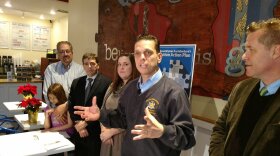Dutchess County hosted its first autism awareness training for first responders Tuesday. It’s part of the county’s Think Differently initiative. The aim is to provide a welcoming and supportive environment for individuals with special needs.
A few dozen law enforcement officers, firefighters, emergency medical technicians and security guards from around Dutchess County attended the autism awareness training. Bill Cannata, program director of the Autism and Law Enforcement Education Center, conducted the training.
“But again, there’s some things that we can do just from the simple training that we had today that’s going to better serve them and have safe outcomes,” Cannata says. “And that’s, to me, that’s what it’s all about, the safe outcomes.”
Cannata, who served as captain in the Westwood, Massachusetts Fire Department, trains first responders nationwide to be better prepared to rescue people with autism in an emergency. He says demand for such training is on the rise.
“The growth is because, in the first response community, there’s been more and more contact. With the numbers that we discussed in the training there — 1 in 68 kids being diagnosed today — there’s more and more contact so therefore more and more agencies are looking for ways to manage people with autism, how they can better serve them,” Cannata says. “ And that’s what we’re sworn to do is to serve our community, and that includes people with autism and all developmental disabilities. And with this training program, we give them the tools to do that.”
It was Christine Matthews’ idea to bring Cannata to Dutchess. She’s with the Slater Chemical Fire Company in Glenham and has known Cannata for some time. Both have children on the autism spectrum. And now Matthews will be trained to become an autism awareness trainer in Dutchess.
“My son, I have had a number of incidences where I haven’t been able to call for help because I’ve been concerned that EMS isn’t prepared to help me. So I’ve been beaten and bloodied and never could call for help because I was unsure of how they would respond. I didn’t want him in handcuffs. I didn’t want him taken away. He wouldn’t understand any of that,” says Matthews. “So when we found Bill, we knew that he went around and trained volunteers, professionals, that he could, he was going to be the guy that was going to teach people how to come into my house and help me.”
She doesn’t want another mother to feel unable to call for help. The first responders in attendance at the training, held at the Dutchess County Department of Emergency Response in Poughkeepsie, learned how to identify the characteristics and behavior of a person living on the autism spectrum; how to respond to an emergency involving someone on the spectrum; how to build relationships with the autism community; and how to use special tactics, rescue techniques and patient care options in such instances. Matt Schlossberg is a volunteer EMT and firefighter in the Arlington Fire District.
“Being in EMS, it’s likely… I haven’t run into it in the past but it’s likely I will see it in the future,” Schlossberg says. “The more you know the better off you are to handle things.”
Cannata has offered training elsewhere in New York, including in Orange County, where he’ll return for the third time in June.
“The biggest piece is they can identify it just by looking at somebody, how their behaviors are, there’s something that will tip them off and, if they do find out if it is autism, how to work with that individual. We gave them the tips today to slow things down. Delayed processing is common,” Cannata says. “So, and, you mention that, a lot of these people, we had a training three weeks ago in Tennessee where it was put to service three hours after the training. They had that call. And also in Worcester, Massachusetts, same thing. They had a 9-12 training and they put it into use at 1 o’clock. So it’s going to happen, and more and more of these calls. We get a lot of feedback like that that they’re having contact almost right after the training.”
Again, Matthews.
“If they get one pearl of wisdom out of today, I think today was a success. If one child is saved because of today, it was a success,” Matthews says. “If one person walks away today feeling different about someone on the spectrum it makes my heart know that we did the right thing in honor of my son and his son and all the other kids on the spectrum.”
Dutchess County’s Think Differently campaign was established in 2015. In addition to training for first responders, County Executive Marc Molinaro, who has a daughter on the autism spectrum, says there is more to come.
“Well, later this year, we’ll be rolling out Project Safe Return. This is technology that families will be able to access from the Department of Emergency Response that if you have a family member that’s prone to wandering, and particularly those on the spectrum have a tendency to wander, it’s technology that you’ll be able to embed in your child’s shoe or backpack so we can track and identify where they might be if necessary.”
He says Think Differently is branching out in other ways.
“Later this year, the Roosevelt home and library will be celebrating Think Differently as part of their Family Celebration Day. And, as a tourist destination, they have done the autism supportive training,” says Molinaro. “We have other tourism destinations in Dutchess that are taking the same kind of training so they’re prepared to welcome families and guests living on the autism spectrum, and that will continue to expand.”
And though there is a Think Differently web site, Molinaro says the county will launch a more comprehensive one later this year.









